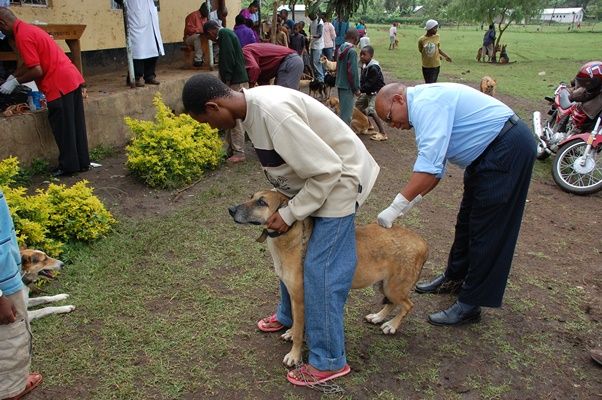A coordinated and sustained programme of dog vaccination against rabies, is effective in preventing transmission of the deadly virus to humans and among animals, and remains key to rabies elimination, according to a Scottish study.
New research, led by the University of Glasgow in collaboration with Ifakara Health Institute and Imperial College London, published today in Applied Ecology, found that rabies incidence in both humans and domestic dogs decreased during a period of sustained dog vaccination in southeast Tanzania, despite incidences of ongoing wildlife rabies infections.
Researchers found that even in areas with a relatively high proportion of wildlife rabies cases, the domestic dog vaccination campaign still reduced the risk to humans. However, after mass dog vaccination ended in early 2017, rabies cases began to rise in some areas once again.

Rabies is one of the world’s most feared diseases due to its high case fatality rate. Despite the existence of safe and effective vaccines, rabies continues to kill an estimated 59,000 people annually in low-and middle-income countries, with children disproportionately affected. For this reason, in 2015 a call for action set the ‘Zero by 30’ goal, to achieve zero human deaths from dog-mediated rabies by 2030.
Most human rabies cases result from bites by rabid animals, either from domestic dogs or, less commonly, wild animals including jackals. Once exposed, immediate treatment is vital as rabies is invariably fatal once clinical signs develop. Treatment consists of a course of vaccinations known as post-exposure prophylaxis, which although highly effective, can be difficult to access due to the cost, limited availability, and low awareness of rabies risks.
Across Africa and Asia, domestic dogs are considered the main hosts for rabies, and over 99% of human rabies deaths are caused by dog bites. Vaccination of domestic dogs against rabies has repeatedly been shown to be successful and cost-effective in preventing human rabies. However, despite this, in many rabies-endemic countries dog vaccination is still not routine. This is primarily due to lack of investment in dog vaccination, but concerns are often expressed that wildlife may play a role in maintaining transmission and dog vaccination may therefore be ineffective.
To answer these concerns the researchers investigated the transmission dynamics of rabies in a previously unstudied area of Tanzania where jackals were found to make up more than 40% of reported animal rabies cases. Collecting data over a nine-year period from 13 districts in southern Tanzania, they used hospital records to identify people potentially exposed to rabies who were then traced and interviewed to determine if the biting animal was rabid. As part of this they were able to examine evidence on whether rabies transmission is sustained in wildlife as well as in domestic dogs, and whether wildlife could present an obstacle to rabies elimination.
The researchers found that rabies incidence in both humans and animals decreased during the period of dog vaccinations, from a high of 218 cases in 2011 to a low of just 15 in 2017. Most human rabies exposures (56%) were from domestic dogs, but approximately one third of transmission events occurred in wildlife, with the remainder due to cross-species transmission between dogs and wildlife.
These findings highlight the potential importance of wildlife as a rabies public health threat and also a potential obstacle to elimination. However, even in areas with a relatively a high proportion of wildlife cases, the researchers found that domestic dog vaccination still significantly reduced the risk of rabies infection to humans.
Professor Katie Hampson, senior author of the study from the University of Glasgow, said: “Our findings confirm that, even in areas where wildlife rabies cases are high, focusing on domestic dog vaccination will have major public health benefits. Moreover, if sustained and coordinated a dog vaccination programme has the potential to eliminate rabies from circulating even in these areas despite the presence of wildlife transmission.
“We were surprised to see how many wildlife rabies cases were occurring in this part of Tanzania. Jackal cases represented a far higher proportion of rabies cases than we’ve seen elsewhere in East Africa. This was why it was such a relief to see that, even with such high numbers of cases in jackals, dog vaccination still led to very clear declines in rabies, in all species, and in people bitten by rabid animals – both dogs and jackals.”
Sarah Hayes, co-author from Imperial College London, added: “Even in this part of Tanzania, where wildlife makes up a large proportion of the reported rabies cases, we have shown that vaccinating domestic dogs can significantly reduce the risk to people and have an important public health impact.
“It is critical that there is continued investment in domestic dog vaccination and this work suggests that the presence of rabies within wildlife populations should not be a barrier to implementing these programmes.”
Kennedy Lushasi, from the Ifakara Health Institute, added: “Even though wildlife cases, especially jackals, appear to make up a large proportion of animal rabies cases and bites to people in south-eastern Tanzania, vaccinating domestic dogs alone resulted in the decline of cases in all species.
“This suggests that wildlife should not be an obstacle in eliminating rabies. The government and other stakeholders should invest in mass dog vaccination programs and these should be sustained to make rabies history.”
The paper, ‘Reservoir Dynamics of Rabies in Southeast Tanzania and the role of cross–species transmission’, is published in Applied Ecology. The work was funded by Wellcome, with additional support from the DELTAS Africa Initiative and EPSRC.











